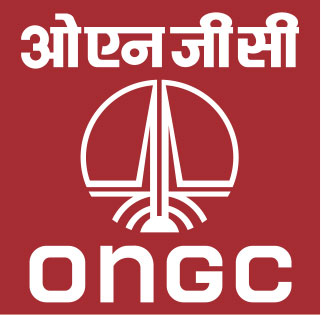Hydrogen is a promising alternative carbon-free fuel, reliable, accessible, safe and affordable as an energy carrier and can provide key solutions for the growing energy demands of 21st century and resolve the issues of global warming and climate change. It is abundant on earth, but in combined form in several compounds and can be produced using a number of different processes. However, producing hydrogen from water by Thermochemical water splitting cycles (TWSC) use both thermal energy and electricity through a sequence of thermochemical and electrochemical reactions wherein the power consumption is substantially less than commercial water electrolysis processes. Therefore, it is imperative to develop more environmentally friendly, affordable, efficient and less carbon dependent hydrogen production methods, as well as strategies to scale-up hydrogen production technologies to address technical and commercial barriers.
ONGC Energy Centre (OEC) is engaged in developing Green Hydrogen Eco-system by following a collaborative consortium mode with various national Centres of excellence by mobilizing national resources devoted on various elements of hydrogen economy with focus on large scale green hydrogen generation to develop cost effective indigenous technology. Key areas of research, development and demonstration (RD&D) are:
- Thermochemical hydrogen generation
- Other methods for hydrogen generation
- Hydrogen storage, Fuel cells
- Energy storage for back-up power supply
- Various supporting technologies development viz. catalysts, electrodes, membranes, sensors etc.
- Thermal energy storage using molten salt and heat integration
- Development of corrosion resistant materials
- Carbon dioxide valorisation
From among various possible options of thermochemical cycles, OEC has chosen two processes viz., Copper-Chlorine (Cu-Cl) cycle and Iodine-Sulfur (I-S) cycle due to relatively low temperature requirement of 550°C and 900°C respectively and opportunities for efficient integration with other energy systems, in particular, nuclear or solar power. So far, OEC has established the processes viz. close-loop Copper-Chlorine (Cu-Cl) cycle and close /open loop Iodine-Sulfur (I-S) cycle at lab / lab engineering scale and the next priority is to scale up using engineering materials using indigenous resources.
1. Closed-loop Cu-Cl cycle in collaboration with ICT, Mumbai
The proof of concept of Cu-Cl cycle was established and the laboratory scale engineering metallic set up for hydrogen generation @25 LPH is operational at ICT, Mumbai. The electrodes, molten salt system for subsequent solar thermal storage, materials selection facilities etc., have been successfully developed. The performance checks of existing systems for prolonged period, separations, purifications and integration of molten salt media as solar thermal heat storage in progress now. Further work on scale up to 12 MT/year hydrogen production is in progress.
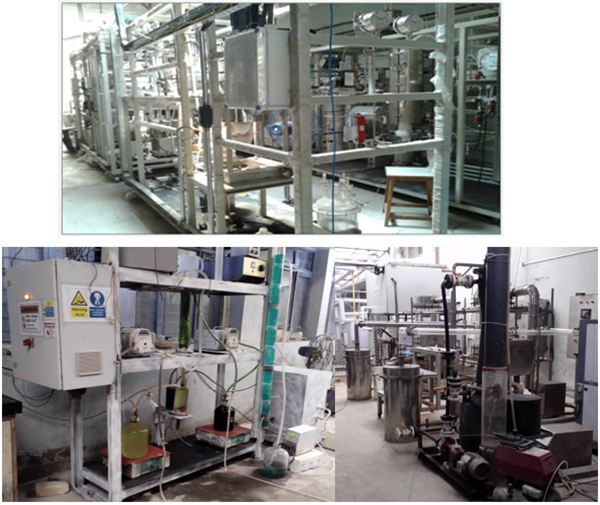
2. Closed Loop I-S Cycle in collaboration with IIT Delhi
R&D on hydrogen production through iodine sulfur (I-S) thermochemical cycle was initiated and closed loop process in a quartz set up was recently demonstrated. Process improvements with modification in electrochemical systems, Purification of acids, minimising cross contamination, heat integration & process control etc., are in progress now to plan for metallic system at 15 bar pressure and 300 LPH hydrogen generation capacity.
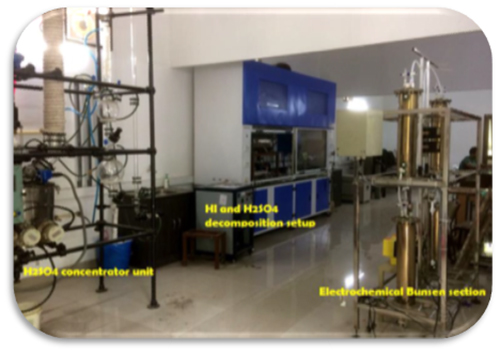
3. Open Loop I-S cycle in collaboration with CSIR-IIP Dehradun
Open loop I-S cycle is an offshoot of closed-loop I-S cycle that aims at developing low temperature alternative route of production of Hydrogen utilising H2S that is produced in refineries / gas processing facilities. The project has dual benefit of minimizing release of H2S to atmosphere as well as generation of Hydrogen. The proof of concept in quartz systems has been established recently and integration of various sub-sections are in progress now based on which a pilot scale metallic system to produce 10-12 MTD H2SO4 is planned.
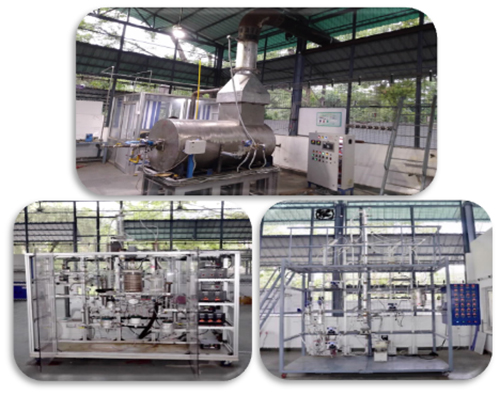
OEC and collaborators have indigenously developed supporting technologies needed for these processes viz., electrochemical and gas separation membranes, electrodes, sensors, high temperature corrosion testing facilities, molten salt storage, Vanadium redox flow battery system for backup power supply to overcome intermittency issues associated with solar power etc. besides hydrogen technologies. Integration of these developed products with main cycles in progress now.
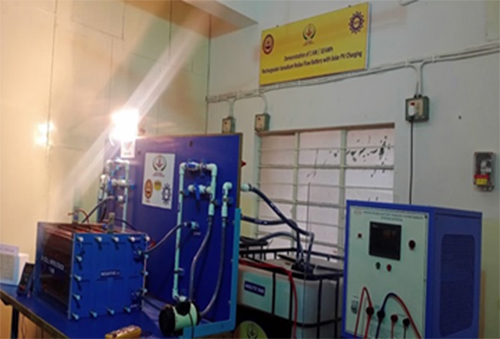
ACHIEVEMENTS: OEC has earned 8 National and 5 International patents for developed processes and products in hydrogen generation and 4 National and 5 International Patents have been filed.
Overall, efforts are being made by OEC for cost effective green hydrogen ecosystem on a fast track mode to meet the large hydrogen requirements anticipated in near future in a techno-economically feasible way.
